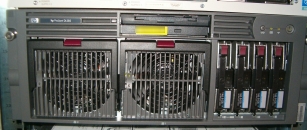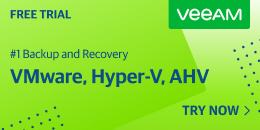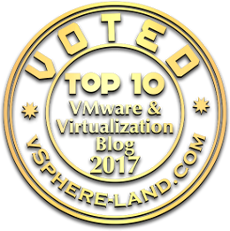Author's posts
May 27 2009
Visual proof of the benefits of virtualization
I was going through some old photos and came across these before and after photos of our virtualization project:
These 3 HP DL385’s

After
And this DL585

After
Replaced this assorted collection of DL360’s, DL585’s, ML530’s, BL10e’s, BL20p’s and more

Before
Visual proof of the benefits of virtualization
May 27 2009
Thin Provisioning Links
vSphere 4 0 Thin Provisioning on EMC Storage (video) (EMC)
Living Thin in a Fat World (IT Blood Pressure)
Reclaiming unused VMDK space with storage thin provisioning (SearchVMware)
VMware vSphere 4 Thin Provisioning: Pros & Cons (The Lone Sysadmin)
Why Thin Provisioning Is Not The Holy Grail for Utilisation (The Storage Architect)
Responsible Thin Provisioning in VMware vSphere (vCritical)
Thin on Thin? Where should you do Thin Provisioning – vSphere 4.0 or Array-Level? (Virtual Geek)
VCE-101 Thin Provisioning Part 1 – The Basics (Virtual Storage Guy)
VCE-101 Thin Provisioning Part 2 – Going Beyond (Virtual Storage Guy)
Get Thin Provisioning working for you in vSphere (Virtual Insanity)
Thin Provisioning Storage Choices (Virtualization Evangelist)
Pointers for using thin-provisioned disks (Virtualization Pro)
VMware ESX 4 Reclaiming Thin Provisioned disk Unused Space (Virtualization Team)
Provision a Thin Provisioned Standby LUN For vSphere Thin Provisioning (VM/ETC)
vStorage Thin Provisioning Datasheet (VMware)
Performance Study of VMware vStorage Thin Provisioning (VMware)
Dynamic Storage Provisioning (VMware)
Thin Provisioning – What’s the scoop? (VMware vSphere Blog)
VMware Thin Provisioning within ESX 4.0 (Xtravirt)
Storage VMotion and moving to a Thin Provisioned disk (Yellow Bricks)
May 27 2009
Check out the new vSphere Evaluators Guide
This 120 page guide was just published by VMware last week and is full of great information related to vSphere. It covers all the major features in vSphere including what they are, use cases for them and how to setup and use them. Don’t let the title of the guide fool you, this guide is great mini-install/upgrade doc and is useful for anyone using vSphere. Here’s a list of the topics covered in the guide:
- vNetwork Standard Switch Configuration
- iSCSI Storage Configuration
- ESX Host Cluster Setup
- High Availability (HA)
- VMotion
- Fiber Channel Storage Configuration
- Host Profiles
- Distributed Resource Scheduler
- Distributed Power Management
- Fault Tolerance
- Storage VMotion and Thin Provisioning
- VMware vApp
- Update Manager
- Linked Mode
- vNetwork Distributed Switch (vDS)
- Private VLAN
- Hot Add
- Dynamic Storage Management
- Alarms
- Management Assistant (vMA)
- PowerCLI
- Basic Network Troubleshooting
- Basic Storage Troubleshooting
- Basic vCenter Server Troubleshooting
May 25 2009
My book dedication
I thought I would share the dedication page that I wrote for my book as there are many people that inspired me and helped made this book possible, here it is:
Dedication
First and foremost, I want to acknowledge some of the members of the VMTN community
who are my peers and, more important, my friends. This includes Ken Cline, whose
knowledge and experience continues to astound me; Dave Mishchenko, whose dedication
to helping others is equal to mine; Edward Haletky, who knows more about security than
anyone I know and is always happy to share his knowledge with others; Oliver Reeh, who
inspired me to start my website; Steve Beaver, whose passion for virtualization is very
infectious; Jason Boche, who is the biggest VMware geek I know; Robert Dell’Immagine,
who runs the VMTN communities; and John Troyer, who is VMware’s head blogger and
virtualization evangelist.
I also want to acknowledge a few fellow bloggers from the thriving VMware user community
who inspire me on a daily basis to help others and be the best that I can be, including
Eric Sloof from ntpro.nl, Scott Lowe from blog.scottlowe.org, Duncan Epping from
yellowbricks.com, Rich Brambley from vmetc.com, and my fellow bloggers at Tech Target.
There are many other bloggers and members of the VMTN community whom I haven’t
mentioned, but you know who you are and you are all an inspiration to me.
I also want to thank Jan Stafford from Tech Target, who got me started in writing, and
all the great editorial staff at Tech Target, including Hannah Drake, Adam Trujillo, Mark
Gallagher, Matthew McDonough, and Jo Maitland.
Finally, I want to thank my editor at Pearson, Trina MacDonald, who gave me this
opportunity and believed in my ability to write this book. Trina is a wonderful person who
helped me through the many behind-the-scenes things that go into writing a book, including
formatting, layouts, and all the other various steps it takes to write a book. In addition,
thanks to my development editor, Songlin Qiu, for correcting my many formatting mistakes.
And, a huge thank you to my technical editors, Ken Cline, Dave Mishchenko, Steve Beaver, and
George Vish, who all kept me honest, and whose great knowledge and experience helped
make this book even better.
May 25 2009
My book is finally available!
As of 5/21/2009 my book, VMware VI3 Implementation & Administration is available in both Kindle format and Paperback format. You might be wondering why you should buy it now that vSphere is out, here’s some reasons why:
- My book is a complete step by step walkthrough of virtualizing your environment, beginning with the assessment and planning phases all the way through the implementation and post-implementation phases like securing, backing up and troubleshooting. Alot of my book content is general in nature and applies to both VI3 & vSphere, so you can use it regardless of which version you are using.
- vSphere has some steep hardware requirements (i.e. 64-bit only) and many companies may not be to afford to upgrade to it for quite some time. VI3 is a solid, stable release and gets the job down for thousands of VMware customers, vSphere is new and many customers will wait until it matures to upgrade to it.
Here is the Table of Contents for my book, it guides you through the many phases of implementing VMware VI3 in your environment:
- Assessing your Current Environment
- Planning your Virtual Environment
- Building your Virtual Environment
- Configuring your Virtual Environment
- Securing your Virtual Environment
- Populating your Virtual Environment
- Monitoring your Virtual Environment
- Maintaining your Virtual Environment
- Backing Up your Virtual Environment
- Troubleshooting your Virtual Environment
- Advanced Topics
Writing this book was quite a lot of work, I learned much from it because there were some areas because there was some areas that I was forced to learn more about so I could become stronger in them and write about them. I’ve just started on my second book which is focused on vSphere and will be a different format than this book and is geared towards being an invaluable companion to every administrator. So until then I think you will enjoy this book and should learn more about VMware virtualization no matter if you are new to it or have been using it for a while. Here’s some quote’s from others that have read my book:
“With this book, Eric has created a roadmap through the intricacies of VMware Infrastructure 3. From initial requirements gathering to advanced configuration topics, the logical progression of the chapters allows the reader to jump in at whatever point makes the most sense in their own environment. Beginners and veterans alike will find themselves using it as both a guide and a reference.”
– Mark Chandler, Infrastructure Engineer Principal, VMware Certified Professional and vExpert 2009
“Through his work at Boston Market, his involvement as a community moderator on the VMTN forums, his management of his own vmware-land.com website, and his active blogging, Eric Siebert has established himself as an expert in the field of virtualization. In this book, he shares his knowledge of VMware virtualization in a manner that will benefit the novice and the expert alike.”
– Ken Cline, Technical Director, Virtualization, Wells Landers
“Eric’s book takes the new VMware administrator by the hand and slaps the seasoned administrator upside the head. He does a great job of covering everything from capacity planning to infrastructure monitoring, all the while explaining the pros and cons that only an experienced virtualization implementer could provide.”
– Rich Brambley, Virtualization Consultant, Owner and sole contributor of http://vmetc.com Blog
“This is another great chance to learn about VMware Virtualization techniques from a well informed seasoned professional. This book is great for someone who is starting out with a VMware infrastructure as well as a seasoned professional looking to reinforce pre-existing knowledge.”
– Stephen Beaver, Virtualization Evangelist, Tripwire
“I have read hundreds of articles by Eric Siebert and always wished that I could have it in a single book. That wish has finally come true. In Eric’s VMware VI Implementation and Administration book, he covers VI up and down, inside and out, like only Eric can. It’s the ultimate VMware VI manual.”
– David Davis, VCP, vExpert – Author of the VMware ESX Video Training Course from www.TrainSignal.com
“VMware VI3 Implementation and Administration educates even the most experienced VI administrator and should be part of every (virtual) toolkit!”
– Duncan Epping, Senior Consultant, VMware and virtualization blogger Yellow-Bricks.com
“This book is a very well written, comprehensive field guide that does a fantastic job of taking the reader across the entire lifecycle of a virtualization deployment – walking through the background information, the planning stages and then the actual implementation itself – and it then wraps things up nicely by providing the help and the knowledge necessary to properly maintain and troubleshoot the virtual environment once it goes live. The advantage of reading a book like this from an author who is a subject matter expert and who obviously has years of hands-on experience with the technology is that you can quickly and easily identify the problem areas and technology gaps before you have to experience them first hand; and you can avoid those common pitfalls and gotcha’s that others have had to go through in their own journey.”
– David Marshall, Owner, VMBlog.com
“As an experienced VMware Certified instructor, I’m involved in delivering VMware courses on a daily basis. I know how important it is to keep your students involved in a course. When you start reading this book, I can assure you, you will read it from A to Z. In the past three years I’ve seen lots of books. Eric Siebert did a great job with this one. He was able to write up topics varying from “installing” and “advanced configuration” in a clear and understandable way and put them together in this book. VMware above and beyond a must read for every VMware believer.”
– Eric Sloof, NTPRO.NL
“VMware VI3: Implementation and Administration is a practical and informative guide on how to get started building a VMware Virtual Infrastructure. Eric Siebert has done a wonderful job explaining in a step-by-step approach (including screen shots) on how to accomplish administrative task on the latest VMware virtualization software. This book will be a handy guide for beginning VMware administrators to implement VMware best practices to avoid problems and enhance performance and security of their virtual machines.”
– George Vish, Senior Education Consultant, Senior Education Consultant
May 20 2009
Unleash the hounds! vSphere is now available!
vSphere is now available! Get it while’s it hot (or until their ftp servers collapse from the overload). Be sure and check out my huge collection of vSphere links so you can get the information you need to implement it.



